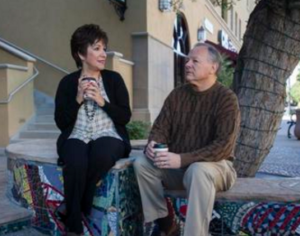Are you a baby-boomer? Have you decided what to do with yourself after your retirement? Are you rethinking boomers?

Before you answer those questions, I’d like to refer you to a fascinating article by Marc Freemen: The Dangerous Myth of Reinvention.
A man is never too old … until his regrets take the place of his dreams.
John Barrymore
Marc Freedman is founder and CEO of Encore.org, which annually gives out The Purpose Prize for social innovators in the second half of life. He is the author of The Big Shift: Finding Work that Matters in the Second Half of Life.
Like many of us, you may not have heard of this organization. And that’s not because it has not been very successful.
For those not familiar with Encore, here’s how they describe themselves:
Encore.org is building a movement to make it easier for millions of people to pursue second acts for the greater good.
We call them “encore careers”. These are jobs that combine personal meaning, continued income, and social impact in the second half of life. An excellent idea, isn’t it?
A lot of this article revolves around two keyword definitions. Here are the words and relevant definitions from the Merriam-Webster dictionary:
Reinvention – A complete remake or redo to bring into use again.
Reintegration- a restoration to a unified state.
We will come back to these definitions in a moment.
We will leave it to you to read Marc’s article in its entirety. In this blog, I will capture components to give my views on the author’s opinions.

Point one
Gary Maxworthy spent three decades in business until a personal tragedy prompted him to reexamine his priorities.
He left the corporate world behind and set off to find his true calling. In the process discovered both a new identity and the path to accomplishing his most important work fighting hunger.
In this telling, Maxworthy is an archetypal example of the reinvention mythology that seems omnipresent today.
This is especially so when it comes to those in the second half of life. Self-help columns are packed with reinvention tips.
For all its can-do spirit, I’ve come to believe the reinvention fantasy. The whole romance with radical transformation unmoored from the past, is both unrealistic and misleading.
I’ll even go further. I think it is pernicious, the enemy of actual midlife renewal.
For the vast majority of us, reinvention is not practical, or even desirable. On a very basic level, it’s too daunting.
How many people have escaped the past, started from scratch, and forged a whole new identity and life?
Sure, it happens. But not often, at least outside of Hollywood.
My view:
Let’s start with the meaning of reinvention, so we are all on the same page.
Reinvention is a remake or redo. But in this context, I believe the remake or redo has to do with the end state of what you want to do.
For example, people have executed reinventions within their careers on many occasions.
I started as an engineer, then went into marketing, and ended up as a business unit executive. The end state in each instance was different. However, many of the skills required for success were the same.
One could refer to these changes as a reintegration or a reinvention.
Not very different indeed? More like splitting hairs?
My conclusion then is that people in retirement have several choices. They can be totally retired and do hobbies, or pick a different end state of activity.
This could be much different than the one that represented their last job. To achieve this new end state, they could reinvent or reintegrate.
In case, many (or perhaps most) skills to be successful would already be there. It is not like they are starting over, in my opinion.
So I believe Marc is splitting hairs here. His conclusion is far overstated.
Point two
More troublesome is the underlying assumption that the past. In other words, our accumulated life experience is baggage to be disregarded and discarded.
Isn’t there something to be said for racking up decades of know-how and lessons?
Considering failures as well as triumphs? Shouldn’t we aspire to build on that wisdom and understanding?
My view:
Don’t understand how he got to this conclusion at all. Whose underlying assumption is this? Not a good one in my opinion.
Everything new we decide to do whether a reinvention or reintegration is built on the old. It is often just ‘reconnecting the dots’ of experience in a different way.
Rethinking boomers … point three
Studying social innovators in the second half of life with a focus on individuals who have done their greatest work after 50. I’m convinced the most powerful pattern that emerges from their stories can be described as reintegration, not reinvention.
These successful late-blooming entrepreneurs weave together accumulated knowledge with creativity. They continually are balancing continuity with change.
They are continually crafting a new idea that’s almost always deeply rooted in earlier chapters and activities.
My view:
Certainly, agree with these points mostly in entirety. However, they do seem in conflict with the previous points, don’t they?
Again I believe that much too much is being made of the differences in the meanings between reinvention and reintegration.

Point four
To me, that’s the most damaging part of the reinvention mythology. It is the preoccupation not only with rebirth, but with youth itself, even as it is slipping away.
Today 70 is upheld as the new 50, 60 the new 40 or even 30, and 50 practically adolescence.
My view:
My opinion is that there are varied reasons why people want to continue to have meaning in their lives and try new things.
It is about the age of continual learning, and you could (and perhaps should) consider this to be age-insensitive.
While I certainly have no real data to back it up, I believe new things and continuous learning has little to do with age in most instances. Notice I did not use either of the terms reinvention or reintegration.
In fact, I would conclude most baby boomers would like to ignore age entirely. They would prefer to make it irrelevant.
My takeaways
I don’t buy into the myth of reinvention. I believe all people, regardless of age, should consider new things. They are just building new skills on top of the old.
Probably none of the new skills will be far afield from the older ones. And for certain, everyone should be as active as possible. This includes continuous learning and engagement in activities with new end states. This is particularly true of ones that ‘give back.’
I certainly believe in ‘encore careers”. That is jobs that combine personal meaning, continued income, and social impact in the second half of life.
Encore.org is a great organization with an impressive mission.
What do you think? Do you have comments or opinions to add to this discussion?

Need some help in building better customer insights from your customer engagement? Creative ideas to help grow your customer base?
Call today for a FREE consultation or a FREE quote. Learn about some options to scope your job of growing customer insights and pay for results.
Call Mike at 607-725-8240.
All you get is what you bring to the fight. And that fight gets better every day you learn and apply new insights that you have learned.
When things are not what you want them to be, what’s most important is your next step. Call today.
Test. Learn. Improve. Repeat.
Are you devoting enough energy to improving your continuous learning for yourself and your team?
Digital Spark Marketing will stretch your thinking and your ability to adapt to change. We also provide some fun and inspiration along the way. Call us for a free quote today. You will be amazed how reasonable we will be.
Check out these additional articles on customer service insights from our library:
10 Next Generation Customer Service Practices
Handling Customer Complaints … 8 Mistakes to Avoid
Customer Service Tips … How to Take Charge with Basics
7 Ways to Create a Customer Service Evangelist Business
Mike Schoultz is a digital marketing and customer service expert. With 48 years of business experience, he consults on and writes about topics to help improve the performance of small business. Find him on G+, Facebook, Twitter, Digital Spark Marketing, and LinkedIn.